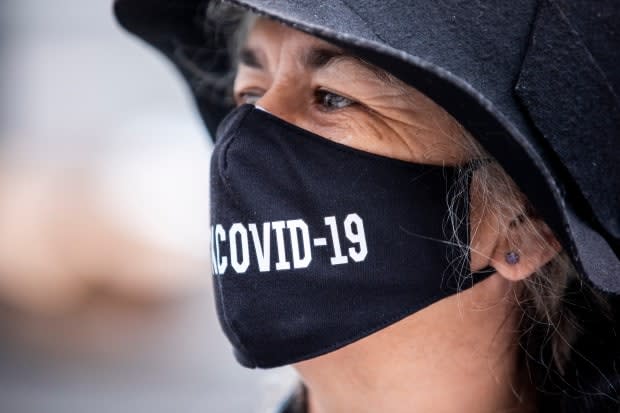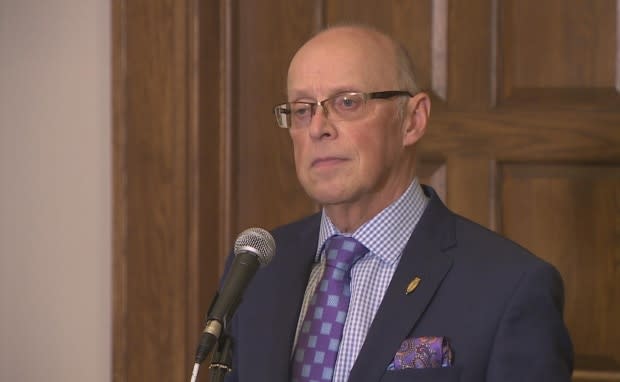Labrador town opts for reduced nursing hours for 3 weeks, rather than have Ontario worker fly in
The Town of St. Lewis, Labrador, has opted to go without nursing backfill for three weeks, after discovering the worker set to fill in would be flying in from Ontario.
Mayor Helen Poole says the community is normally staffed with two full-time nurses. One of those nurses is on leave, and Labrador-Grenfell Health had a locum — or contract worker — set to come into the town this week to fill in for the last three weeks of that leave.
When people in the small community of about 200 people found out the backfill nurse would be coming in from Ontario — which is seeing hundreds of new cases daily — they were worried, and started calling council members.
"Residents were concerned because they were coming from outside the Atlantic region — the Atlantic bubble — and they were coming from Ontario, which is a very hot bed of COVID," Poole said, adding that many of the town's residents are seniors or have compromised immune systems.
"This was something that they were worried about, right? Because it would put them at unease to be going to the clinic with someone from Ontario."
We were faced with a big decision. It wasn't taken lightly. - Helen Poole
Poole said the town arranged a meeting with Labrador-Grenfell Health to discuss the issue and get some more information.
They were told the nurse would not be self-isolating for 14 days, in accordance with regulations for essential workers coming in from out of province. That nurse would be wearing personal protective equipment while working to ensure safety, and be required to isolate while not working.
The town held an emergency meeting Monday night — just days after an essential worker in Happy Valley-Goose Bay who travelled from Saskatchewan was found to be positive for the virus — and community members decided they'd rather forgo the backfill of one of their nurses for that period.
"We all decided that we would pass on having a nurse come in from Ontario and decided that we would work with one nurse for these three weeks and the on-call hours would be forwarded out to another town," Poole said.
"We were faced with a big decision. It wasn't taken lightly."

The full-time nurse will work regular day-shift hours. If a resident calls the emergency health line after hours, that call will be forwarded to the nearest community, about 45 minutes away.
Poole said a big part of the discussion among council and residents was what would happen in a dire emergency — since the town has no ambulance — but residents said they felt safer with reduced staffing than with someone coming in from Ontario.
She added that health-care staffing has always been an issue in the region, and there have been times when staffing has been reduced. However, she said, it is "a little bit concerning" to have a shortage for an extended period of time, and hopes this temporary measure doesn't set a precedent.
"We're OK with the decision. We're satisfied with the way that we handled it but we are still short — having a lesser services right now … and we're just hoping that nothing major comes up," she said.
"We're crossing our fingers."
'The community has a right to do that'
Cartwright-L'Anse au Clair MHA Lisa Dempster said she can understand why people in the community would be worried about someone coming in from outside the bubble.
"We only have to turn on our TV each evening for the last six or seven months and we see the impacts of COVID around the world," she said.
Dempster added that the numbers in Newfoundland and Labrador show that public health measures are effective, but if a community agrees it's not worth the risk, the choice is theirs.
"The community expressed concern, and you cannot dismiss that," she said.
"The nurse, she'll be in full PPE when seeing patients and you will be in your mask and public health deems that safe, and that's part of living with COVID going forward. However, if you say no to the nurse — the community has a right to do that as well."
Health Minister John Haggie said the town's concerns are understandable, especially since the more isolated coastal and rural communities have been vigilant about having people coming into the town from outside during the pandemic.
However, he said there may be other considerations within Labrador-Grenfell Health, but that would be up to that health authority to look into.

"The easy operational option there would be to see if there is someone who is already scheduled from one of those areas who could be rotated into St. Lewis. Those are operational issues and I think the town and the CEO need to continue their discussions to see what can be done," Haggie said.
"Certainly it's a situation where we are looking again to see what the definition of essential truly is and to make sure that it's done in the safest way possible."
Haggie added that the majority of the province's locum health-care workers — about 75 per cent — are from within Newfoundland and Labrador.
"Of the remaining 25 per cent, anywhere from half to two thirds have come from within the Atlantic bubble, and it's the last little group of maybe somewhere between four and six people a month who come from outside the Atlantic bubble," Haggie said, adding that even during a pandemic, the challenge of recruitment is the same.
"But our plan is life with COVID — we know that cases will come. We need to protect the people of this province and minimize the impact of any such case, so I think this has been an important discussion and will continue to be," Haggie said.
"I think we're just gonna have to wait and see what comes out of the discussions with Labrador-Grenfell and with the community."
Read more from CBC Newfoundland and Labrador


